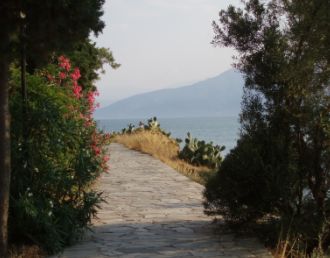Here are some questions you might have if you are a high school student or an undergraduate who is considering joining our department. If you do not see your concerns represented, please feel free to contact us!
-
Do I have to know Latin?

Looking down from the acropolis of Lindos, Rhodes NO--our undergraduate major in Classical Studies encourages but does not require the pursuit of one or both of the department's ancient languages. Catholic University has a language requirement of its own, but majors in Classical Studies can fulfilll this requirement with any ancient or modern language of their choice.
-
What if I want to go to graduate school in classics?
If you want to go to graduate school in this field, you will need to learn both Greek and Latin. Our department specializes in teaching the ancient languages especially well, and students who have studied advanced-level Greek and Latin with us have entered graduate school in the field at schools like Harvard, Virginia, Toronto, Villanova, Pittsburgh, Vermont, Fordham, and Florida State. We are also very proud of the careful advising we provide to students applying for scholarships and fellowships. -
Can I study abroad?

The town of Fira on the island of Santorini, Greece YES! Not only can you study abroad, but as a major in Classical Studies, you should study abroad if at all possible. The civilizations of ancient Greece, ancient Rome, and medieval Europe come alive when you can actually visit the sites, walk the streets, climb the hills, and experience the art works firsthand. We encourage all of our students to spend a summer, a semester, or more in another country. The most popular destinations for our students tend to be Italy, Greece, and England.
-
What are college classics courses like when they are taught in English?

The path from the Old Town to the beach in Nauplion, Greece Imagine an entire class that focused on (for example) mythology, or Roman art and architecture, or the history of the ancient Near East and ancient Greece. These are just a few of the exciting courses that are regularly offered in our department, and they are also required for some of our degree programs.
In our department, we label these courses with numbers and the prefix "CLAS." For us, this means that these courses use readings only in English, with no Latin or Greek expected or required. These kinds of courses are open to students at all levels, even freshmen.
Our CLAS courses meet either three days per week for 50 minutes or two days per week for 75 minutes. They are usually taught by full or adjunct members of our departmental faculty, which means they are an excellent opportunity to get to know our professors. To prepare for these classes, students usually complete homework in the form of readings in English, and then come to class to listen to lectures, view images, and participate in discussions about the material. At various points during the semester, short papers are often assigned, and there may be a longer paper due at the end of the course. There are sometimes quizzes, along with (generally) midterm and final exams.
-
What are college Latin (and Greek) language courses like?

The dome of St. Peter's, Rome It depends upon how long you have been studying the language! We will talk about Latin here, since that is the ancient language that is more frequently offered in high schools.
The first year of college Latin
During the first college year of Latin study at Catholic University (for us, this year consists of two one-semester courses, called LAT 101 in the fall and LAT 102 in the spring), students come to class for 50 minutes, four days per week. Class meetings focus on the study of Latin "morphology and syntax," which are really just technical terms for Latin word forms and the kinds of constructions those word forms use to build sentences.
First-year college Latin uses a textbook and concentrates on learning to read Latin sentences of all kinds. By the end of the year, students have studied all of the major concepts in Latin grammar and started translating short passages from real Latin literature. Homework to prepare for first-year Latin classes usually consists of sentences to translate into and out of Latin, as well as the memorizing of forms and vocabulary for quizzes and tests.
What is now studied outside of Latin class
When you were in high school, you probably covered Roman culture in your Latin class, and you may even have participated in festivals, competitions, and national examinations that embraced the larger Roman world. Our department offers courses in these areas as well, like Roman history, mythology, and Roman art and architecture, so that everything can be covered in much greater detail than it would if it had to share time with language study.

The dome of the Shrine at sunset, looking towards McMahon Hall, home of our department The second year of college Latin
The second year of college Latin at Catholic University (consisting of LAT 103 in the fall and LAT 104 in the spring) focuses on helping students learn to read Latin literature in the original. Second-year Latin courses meet for 50 minutes, three days per week, and students usually prepare for class by translating an excerpt from a Latin author and rereading it as often as they can. At class, they take turns translating again, directly from the Latin text, and ask and answer questions about the grammar of the passage. By LAT 104, our students are studying Vergil's Aeneid and beginning to learn about Latin literary style.
Advanced placement
For comparison, a student who receives a 5 on any Latin AP exam will place out of LAT 101-102-103-104 and go right into the higher-level courses we are about to describe.
The third year of college Latin and beyond
After LAT 104, our students are ready for courses in Latin prose composition (where they learn to write in Latin!) and for courses on various Roman authors or time periods, such as Livy, Horace, and Roman literature from the age of Nero. In "author-level" courses, students prepare for class by reading assigned passages of text, along with (often) selected commentaries and analyses by modern scholars. In class, they translate, discuss the text, and sometimes give presentations or write papers. As a department, we are very proud of the way we study and teach the ancient languages. Our students are encouraged to master Latin (and, depending on their degree programs, Greek) to the very best of their abilities.
-
Who will teach me? Do students at Catholic University work closely with the faculty?

The Trevi fountain, Rome Absolutely! Catholic University is, in many ways, a "best of both worlds" institution, where intensive research is balanced with careful mentoring and great teaching.
But what does this really mean for you? In the Department of Greek and Latin, it means, above all else, that you will be part of a community of explorers. All of us, from freshmen to faculty, are working constantly to know more about the ancient and medieval worlds, and we share our discoveries both inside and outside the classroom, from professional conference presentations to office hours.
Our faculty are highly accessible: the full-time faculty keep office hours every semester that they are in residence. Our office suite also contains the departmental library, a space much used by faculty and students alike, and so all the members of our department tend to see one another very frequently. Informal consultation is common, and our students know they can make an appointment with any faculty member they wish to ask for advice.
Depending upon which courses you select, your curriculum as a Classical Studies major will probably include courses that are taught by members of our full-time faculty, our adjunct faculty, and our TFs and TAs (graduate teaching fellows and teaching assistants). You will get to know as many of our scholars and teachers as possible during your time at Catholic University, and by the end of your junior year, you will select one of our departmental faculty members to supervise your senior project, a special yearlong research effort that you will design and complete under your professor's individual direction.
-
If I study classics in college, what kind of job can I get when I finish school?
Many people think that studying classics in college automaically means pursuing a career as a professor or as a high school teacher. These are certainly possible, but there are many, many, MANY other options as well. It depends on how you want to use what you have learned.
Law school remains a popular option (perhaps because our location in Washington, D.C. makes it possible for our students to study both ancient and modern politics at the same time!), but other recent graduates have pursued studies or careers in media, writing, public policy, art conservation, and IT.
If you know you want to stay in or near the field of classics, you might want to consider going to graduate school for an M.A. (or even a Ph.D.), pursuing a career in library work or publishing, entering museum work, seeking a position in a high school, or training to become an archaeologist.
-
Can I double-major in Classical Studies along with something else?
Yes! Classical Studies is so flexible that it can easily double with most other areas of study, especially because its coursework can be carefully selected to complement your other interests. This is true even if you also want to study abroad or pursue multiple tracks or the University Scholar designation in the Honors Program (see below). The key is remaining in close and frequent contact with your faculty advisers in all of your areas of academic interests: with their help, you can strategize carefully in order to get the most out of your college career.
-
Can I combine Classical Studies with the Honors Program?
Absolutely! Many successful Catholic University classicists have also been Honors students, and some of them have chosen to pursue University Scholar status at graduation, too. The best path towards success as an Honors classicist is just frequent consultation with the departmental undergraduate adviser, since many Honors courses help to fulfill other degree requirements as well as counting towards your achievements in the Honors program.
-
What about minors? What are they good for?
Minors are smaller areas of concentration (groups of courses in a certain subject) that can complement or contrast with your major. They can be used to demonstrate special skill in something that might not be obvious (for example, a chemistry major with a minor in German might qualify to work overseas one day), to deepen and expand your major (for example, a major in Classical Studies might go well with a minor in Art or in Anthropology), or to add career qualifications (like a minor in Secondary Education for someone who might like to teach). You can even use a minor to receive academic recognition for something that you simply enjoy.
You can also minor with us if you are majoring in something else! We offer minors in Ancient Greek Language and Culture, in Latin Language and Roman Culture, and in Classical Studies, all of which make great add-ons to your degree.
-
How can I get started on a minor in this department?
If you want to try one of the minors in the Department of Greek and Latin, you can just start taking some of the courses and see how you like them. But once you decide you would actually like to pursue and complete a minor, you should make an appointment with our undergraduate adviser to have your transcript checked and see what courses you still might need to take. You also need to "declare" your minor by submitting a form to the appropriate dean's office, and our adviser can help you with that, too.
-
I am already minoring in something else. Can I add another minor?
Absolutely! Depending upon what other goals you have within your degree (study abroad, Honors, double majors, and the like), it may be possible for you to complete one, two, or even three minors if you choose your courses wisely, and our undergraduate adviser will be glad to offer help with that.
